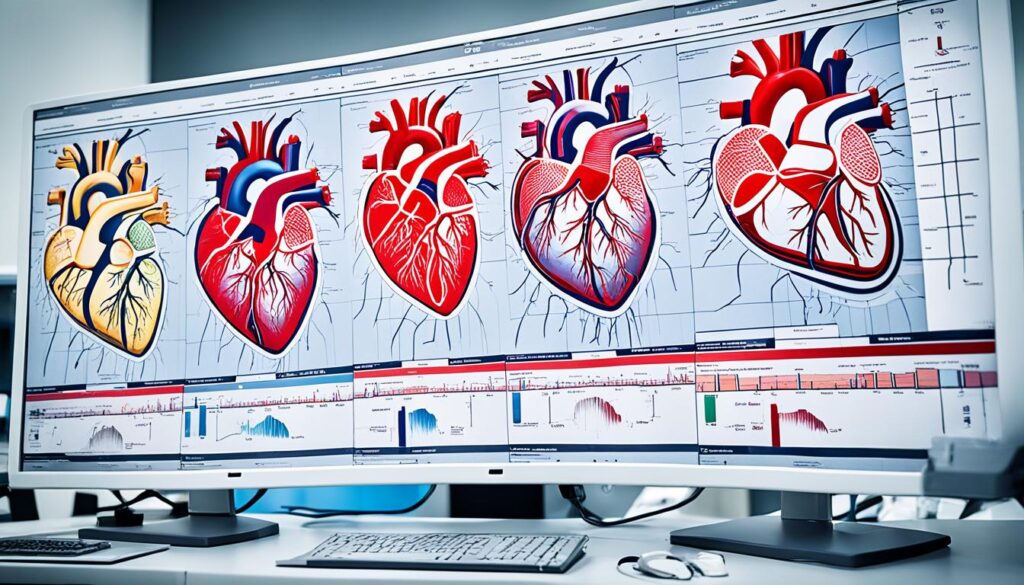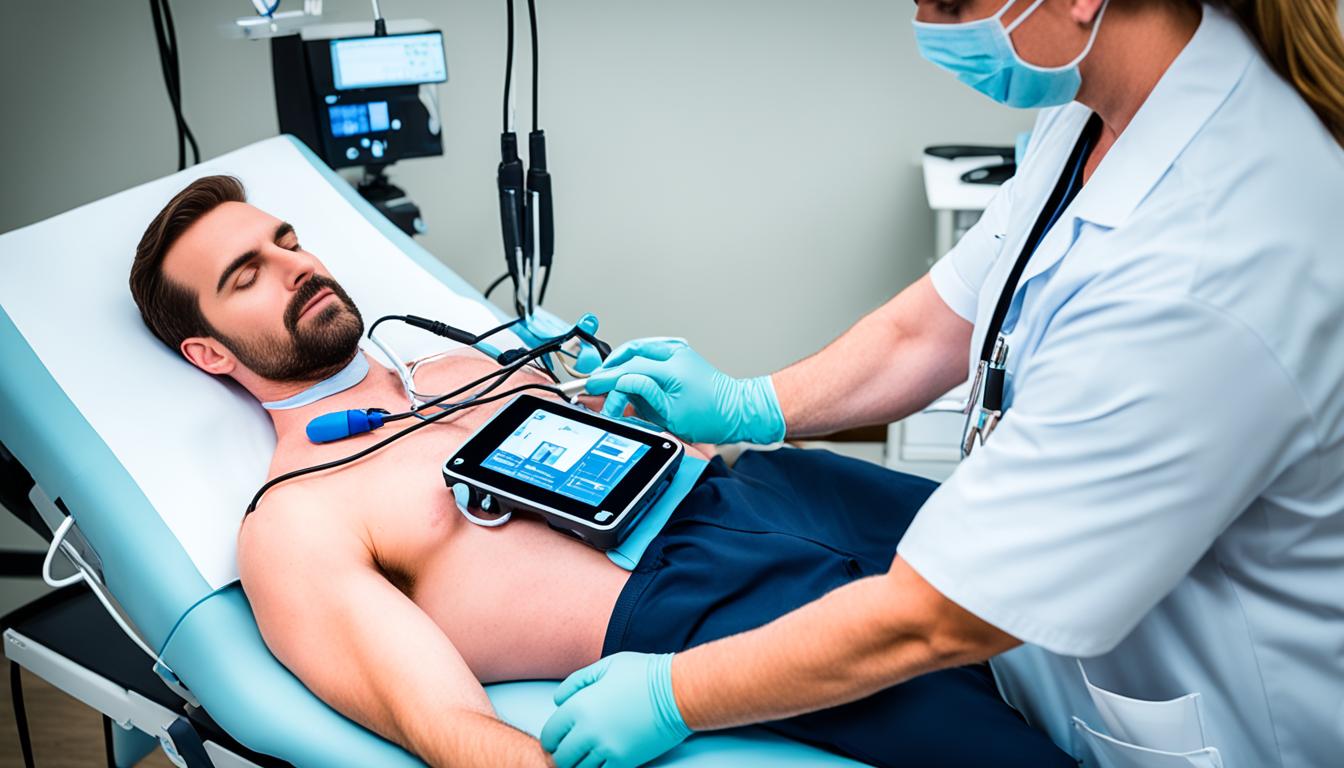Did you know that cardiovascular disease is the leading cause of death globally, accounting for over 17.9 million deaths each year? With the increasing prevalence of heart-related conditions, the demand for skilled professionals in the field of medical sonography has never been higher.
Whether you are considering a career in healthcare or looking to specialize within the field of sonography, understanding the crucial fact of cardiovascular sonography vs diagnostic medical sonography is very important. In this article, we will explore the nuances of these specializations, their roles and responsibilities, educational requirements, job outlooks, and even salary prospects, helping you make an informed decision about your healthcare career path.
Key Takeaways:
- Cardiovascular sonography and diagnostic medical sonography are two distinct specializations within the field of medical sonography.
- Understanding the differences between these specializations can help you choose the right career path for yourself.
- Cardiovascular sonographers focus specifically on imaging the heart and blood vessels, while diagnostic medical sonographers perform a broader range of imaging procedures.
- Both specializations require specialized education and certification, but the specific requirements may vary.
- Job prospects and salary potential are favorable in both cardiovascular sonography and diagnostic medical sonography.
Understanding the Specializations in Sonography
In this section, we will explore the specializations of cardiovascular sonography and diagnostic medical sonography in detail. We will define what each specialization entails and discuss the types of individuals who may be interested in pursuing each career path. By understanding these specializations, individuals can make informed decisions about their healthcare career goals.
What Is Cardiovascular Sonography?
Cardiovascular sonography, also known as cardiac sonography, focuses on imaging the heart and blood vessels. Cardiovascular sonographers use specialized ultrasound equipment to capture images of the heart and its structures, helping to diagnose and monitor various cardiovascular conditions. They may perform echocardiograms, stress tests, and vascular studies to evaluate heart function, blood flow, and detect abnormalities.
What Is Diagnostic Medical Sonography?
Diagnostic medical sonography, often referred to as general sonography, encompasses a broader range of imaging procedures. Diagnostic medical sonographers use ultrasound technology to produce images of the body’s organs, tissues, and blood flow. Their work helps physicians diagnose and monitor a wide range of medical conditions. These professionals can specialize in various areas such as obstetrics and gynecology, abdominal sonography, or pediatric sonography.
Choosing Between the Paths: Who Are They For?
Deciding between cardiovascular sonography and diagnostic medical sonography depends on individual interests and career goals. Here’s a breakdown of who these specializations may be suitable for:
- Cardiovascular Sonography: This specialization is ideal for individuals who have a keen interest in the cardiovascular system, enjoy working with cardiac imaging technology, and have a desire to directly impact patient care in cardiovascular medicine.
- Diagnostic Medical Sonography: This specialization is suited for those who have a broad interest in medical imaging and want the flexibility to work in various medical settings. It offers the opportunity to specialize further in specific areas like obstetrics, abdomen, and pediatrics.
Understanding the nuances of these specializations can help aspiring sonographers make informed decisions about their career paths.
Cardiovascular Sonography vs Diagnostic Medical Sonography: Roles and Responsibilities
In this section, we will explore the specific roles and responsibilities of cardiovascular sonographers and diagnostic medical sonographers. Understanding the tasks and duties associated with each specialization provides valuable insights into the day-to-day responsibilities of professionals in these fields.
What Do Cardiovascular Sonographers Do?
Cardiovascular sonographers, also known as cardiac sonographers, play a crucial role in the diagnosis and treatment of heart conditions. Using specialized ultrasound equipment, they perform imaging tests to capture detailed images of a patient’s heart and blood vessels. These images help cardiologists and physicians assess cardiac function, identify abnormalities, and guide treatment plans.
The responsibilities of cardiovascular sonographers include:
- Conducting patient assessments and obtaining medical histories
- Performing ultrasound procedures to evaluate the structure and function of the heart and blood vessels
- Analyzing and interpreting ultrasound images to identify potential cardiac abnormalities
- Collaborating with healthcare professionals to provide accurate diagnostic information
- Providing patient education and support regarding ultrasound procedures and results
Tasks and Duties of Diagnostic Medical Sonographers
Diagnostic medical sonographers, also known as general sonographers, are responsible for imaging various areas of the body using ultrasound technology. They work closely with physicians and other healthcare professionals to gather important diagnostic information that aids in the diagnosis and treatment of medical conditions.
The responsibilities of diagnostic medical sonographers encompass a wide range of tasks, including:
- Preparing patients for ultrasound examinations and explaining the procedures
- Performing ultrasound scans to assess different body systems, such as the abdomen, pelvis, and reproductive organs
- Analyzing and interpreting ultrasound images to identify abnormalities or potential medical conditions
- Providing accurate and detailed reports of findings to healthcare providers
- Collaborating with the medical team to plan and guide patient care

Advancing Your Career: Education and Certification in Sonography
In order to pursue a successful career in cardiovascular sonography or diagnostic medical sonography, it is essential to meet the education and certification requirements specific to these fields. This section will provide an overview of the educational requirements for cardiovascular sonography and a program overview for diagnostic medical sonography. Additionally, we will discuss the essential certifications that aspiring sonographers should obtain.
Educational Requirements for Cardiovascular Sonography
The field of cardiovascular sonography requires a strong educational foundation to develop the necessary skills and knowledge. To become a cardiovascular sonographer, individuals typically need to complete an accredited cardiovascular sonography program. These programs can be found at universities, colleges, and technical schools and usually result in an associate degree or certificate upon completion.
The coursework in cardiovascular sonography programs typically includes a combination of didactic instruction, laboratory work, and clinical practice. Students learn about cardiovascular anatomy and physiology, diagnostic imaging techniques, patient care, and medical ethics. Clinical rotations provide hands-on experience and help students develop the skills required for this specialized field.
Diagnostic Medical Sonography Program Overview
For those interested in pursuing a career in diagnostic medical sonography, completing a comprehensive diagnostic medical sonography program is necessary. These programs aim to equip students with the knowledge and skills needed to excel in this rewarding field. Diagnostic medical sonography programs are available at various educational institutions, including community colleges and private healthcare training centers.
The curriculum of a diagnostic medical sonography program covers a wide range of topics, including human anatomy and physiology, ultrasound physics and instrumentation, medical terminology, and patient care. Students gain practical experience through clinical rotations in diverse healthcare settings, where they have the opportunity to work with patients and apply their learning in a professional environment.
Essential Certifications for Sonographers
Obtaining the right certifications is crucial for advancing your career as a sonographer. The most recognized certification for cardiovascular and diagnostic medical sonographers is the Registered Diagnostic Medical Sonographer (RDMS) credential, offered by the American Registry for Diagnostic Medical Sonography (ARDMS).
To earn the RDMS certification, candidates must meet specific educational requirements, complete clinical experience, and pass a comprehensive examination in their chosen specialty area. The different specialty areas within diagnostic medical sonography include abdominal, breast, obstetric and gynecologic, pediatric, and vascular sonography. By obtaining the RDMS certification, sonographers demonstrate their commitment to professional excellence and gain a competitive edge in the job market.
The Future Prospects: Job Outlook and Salary
In this section, we will explore the employment opportunities and salary prospects in cardiovascular sonography and diagnostic medical sonography. Understanding the job outlook and earning potential can help individuals make informed decisions about their career paths in these specializations.
Employment Opportunities in Cardiovascular Sonography
Employment opportunities in cardiovascular sonography are expected to grow steadily in the coming years. As the demand for non-invasive medical imaging procedures continues to rise, there will be a need for skilled professionals who can perform cardiac and vascular ultrasound examinations. Job prospects are particularly promising for those who are certified in cardiovascular sonography and have experience in specialized areas such as echocardiography and vascular imaging.
Cardiovascular sonographers can find employment in a variety of healthcare settings, including hospitals, diagnostic imaging centers, cardiology clinics, and physicians’ offices. They play a crucial role in assisting physicians in the diagnosis and treatment of cardiovascular conditions, making it a rewarding and impactful career choice.

Diagnostic Medical Sonography: A Comprehensive Overview
Diagnostic medical sonography offers a comprehensive range of employment opportunities across various medical specialties. Sonographers in this field work closely with physicians to capture images of organs, tissues, and blood flow using ultrasound technology. These images help diagnose medical conditions and guide treatment plans.
The job outlook for diagnostic medical sonography is highly promising, with consistent growth projected in the healthcare industry. Advancements in medical technology and an increasing aging population contribute to the sustained demand for diagnostic ultrasound services. Professionals in this field can find employment in hospitals, imaging centers, physician offices, and other healthcare facilities.
With continuous technological advancements and expanding applications of ultrasound imaging, the field of diagnostic medical sonography offers a wealth of opportunities for career growth and specialization.
Conclusion
After examining the key differences between cardiovascular sonography and diagnostic medical sonography, it is clear that both specializations offer unique opportunities for individuals interested in pursuing a career in healthcare. Cardiovascular sonography focuses specifically on imaging the heart and blood vessels, while diagnostic medical sonography encompasses a broader range of imaging procedures for various organs and systems of the body.
When considering which specialization to choose, it is important to evaluate your interests and career goals. If you have a strong passion for cardiology and want to specialize in imaging the heart, cardiovascular sonography may be the right path for you. On the other hand, if you have a broader interest in medical imaging and want to work with different organs and systems, diagnostic medical sonography may be a better fit.
Regardless of the path you choose, both cardiovascular sonography and diagnostic medical sonography offer rewarding careers with ample job opportunities and competitive salaries. By obtaining the necessary education and certifications in your chosen field, you can embark on a fulfilling healthcare career that allows you to make a positive impact on patients’ lives.
In conclusion, the key to making an informed decision about your sonography specialization lies in understanding the differences between cardiovascular sonography and diagnostic medical sonography, as well as considering your own interests and career goals. Take the time to explore both specializations, weigh the pros and cons, and envision where you see yourself in the future. With careful consideration, you can choose the path that aligns best with your strengths and aspirations, paving the way for a successful and rewarding career in medical sonography.




